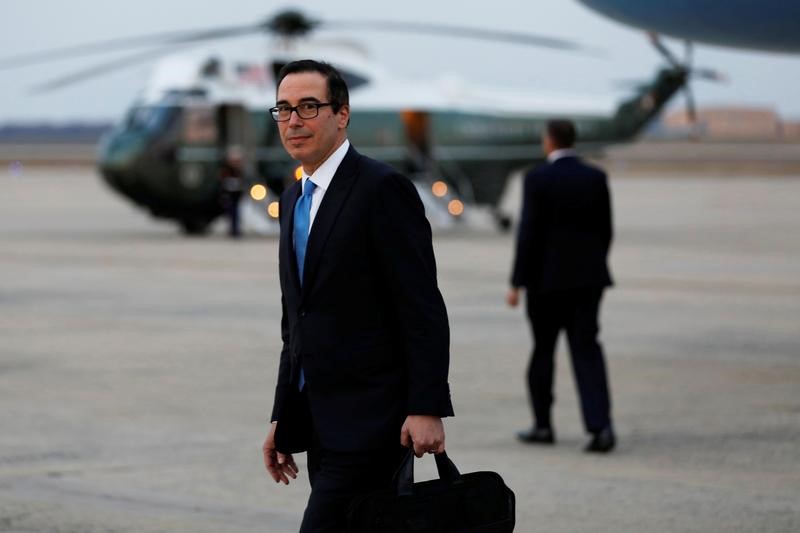 © Reuters. FILE PHOTO: U.S. Treasury Secretary Steve Mnuchin arrives at Joint Base Andrews
© Reuters. FILE PHOTO: U.S. Treasury Secretary Steve Mnuchin arrives at Joint Base AndrewsWASHINGTON (Reuters) – The U.S. Treasury Department said in a report submitted to Congress this week that expanding sanctions on Russia to include new sovereign debt would have “negative spillover effects” on global financial markets and businesses.
Given Russia’s large economy and deep connections to world markets, widening debt-related sanctions could hurt “both the Russian Federation and U.S. investors and businesses,” said the report, submitted to Congress on Monday and obtained by Reuters on Friday.
Russian government bonds, known as OFZs, rallied on the news of Treasury’s position. Investors in OFZ bonds, popular for their lucrative yields, have been on alert about new sanctions recently and have bought Russian debt for fear of losing access to it in the future.
While Treasury’s memo does not make any recommendation for or against future sanctions, the congressionally mandated report repeatedly cites the risk that expanded measures could harm U.S. investors.
The memo, which was first reported by Bloomberg, said that strengthening sanctions on sovereign debt could put downward pressure on Russian economic growth, increase the strain on the banking sector and “lead to Russian retaliation against U.S. interests” and could affect the “competitiveness of large U.S. asset managers.”
The United States imposed sanctions on Russia to punish Moscow over its 2014 annexation of Crimea. The sanctions targeted some of the most important sectors of the Russian economy by limiting U.S. financing available to some of Russia’s most powerful energy enterprises and banks.
For example, last year Washington toughened restrictions on energy giants like Gazprom (MCX:) and Lukoil, prohibiting U.S. banks from issuing them new debt with longer than 60-day maturity.
Treasury Secretary Steve Mnuchin told lawmakers at a hearing on Tuesday that new sanctions would eventually be imposed on Russia in response to Moscow’s interference in the U.S. election.
A Treasury spokesman said in an emailed reply to questions that while expanding the debt sanctions even more would hurt Russia, it could also “hinder U.S. business in both the financial sector and real economy and potentially disrupt global markets.”
U.S. President Donald Trump’s administration on Tuesday published a list of 210 Russians, including 96 so-called oligarchs worth $1 billion or more, as required under a sanctions law passed by Congress.
It did not, however, immediately impose any new penalties on them, drawing criticism from senior Democrats in Congress, who accused Trump of being soft on Russian President Vladimir Putin.
Fusion Media or anyone involved with Fusion Media will not accept any liability for loss or damage as a result of reliance on the information including data, quotes, charts and buy/sell signals contained within this website. Please be fully informed regarding the risks and costs associated with trading the financial markets, it is one of the riskiest investment forms possible.
Source: Investing.com




























